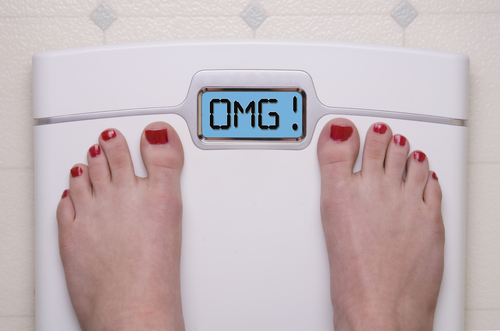How Often Should You Weigh Yourself?

You need to find what works best for you, but for most people, once a week is enough. If you weigh yourself more often than that, you can drive yourself crazy. You might find yourself focusing more on the number on the scale than on the healthy eating behaviors that are letting you hit those numbers. It’s okay if you want to weigh yourself more often than once a week. Just make sure you don’t take every day’s weigh-in too seriously.
Your Body Weight Goes Up and Down Naturally
If you’re not careful, you could end up giving yourself quite a scare when you step on the scale. That’s because your body’s weight goes up and down with normal fluctuations. Even if you’re losing weight, your weight could go up temporarily because of fluid retention for many reasons.
- You ate a lot of sodium (high-salt foods) in the past day.
- You got dehydrated and your body is now holding onto water.
- You ate a big (heavy) meal…which shouldn’t be happening after weight loss surgery!
- (Women) time of the month – your menstrual cycle.
- You’re wearing heavy clothes.
How to Weigh Yourself
Did you know there’s a “right” and a “wrong” way to weigh yourself? If you accidentally weigh yourself when your weight is on an “up” fluctuation, the number you see could be pretty discouraging.
Here are some tips for getting a trustworthy number when you get on the scale.
- Weigh yourself first thing in the morning.
- Wear only light clothes or weigh yourself without clothes after getting out of the shower.
- Do not wear shoes to weigh yourself.
- Choose a certain day of the week to weigh yourself for your “official” weigh-in.
- Take a second before you step on the scale to think about what number you expect based on how well you did in the past week.
What to Expect from the Scale Post-Op
Everyone’s weight loss surgery journey is unique and unpredictable, but you might experience some of the following during the first year after WLS.
- Very fast weight loss in the first two weeks post-op – from 10 to 30 lbs.
- A stall during weeks 3-4 as your body catches up.
- Some weeks and months of steady weight loss from 0.5 to 2 or more lbs. per week.
- Some stalls of 1-2 weeks or more with no weight loss.
Using the Scale to Prevent Regain
The scale may not be as exciting once you hit maintenance, but it can still be helpful. While some people put the scale away, others continue to use it for regular weigh-ins. But how seriously should you take the number? Fluctuations of a couple of pounds up or down are normal, so there’s no need to worry about little changes.
You might want to take notice if your weight goes up by 5 lbs. above your goal weight. That’s when it’s time to take a good look at your diet and see if you’ve slipped up in any of your habits. Are you still taking small portions, eating protein first, and avoiding junk food?
The scale is one of your best tools for losing weight and keeping it off, so make the most of it! Using the scale properly can help you monitor progress and stay motivated. Just don’t take a single reading too seriously. Your eating decisions and healthy behaviors are way more important in the long-term than a single number on the scale.
I know everyone is different in the way they think about how often to weigh themselves.
Those first few days following surgery,
I couldn't wait to jump on the scale and watch as my weight started to fall.
I got very anxious if I saw the scale stay the same or (gasp!) creep up.
I chose not to take it too seriously and made a deal with myself.
#1 - The only weigh in that counted was 1st thing in the morning - before I got dressed, drank or ate.
#2 - I could weigh myself as often as I wanted during the day. If I started getting anxious about the fluctuations in my weight during the day.... see rule #1!
This system has worked well for me for almost 3 years.
And when I start worrying about not losing or losing slower than I wanted,
I just remind myself of how fast I WAS NOT losing weight before surgery.
I weigh every single morning right when I get out of bed. This is helpful to me because if for some reason I see a trend that my weight is inching upward, I make the immediate changes in eating that day and everyday until I am back within my acceptable range. As an example, last week I had a few things I probably shouldn't and I woke up a pound over the 2-3 pound fluctuation I give myself. That day I went back to my healthy eating plan, logged everything into MyFitnessPal, and now I am back inside my goal range. I feel like I can really enjoy life when I know that every day I make decisions that keep me in a healthy weight range. I do fluctate sometimes based on sodium, but I am so much saner when I know exactly what I weigh everyday. Sometimes I feel like my clothing is a little tight, or I catch a glimpse of myself in a mirror where I feel like I look chunky and I don't freak out over it because I have that nice, quantifiable value on my good old scale and I know that as of a few hours ago I was a weight I find acceptable. The little things don't bug me when I can rely on a solid daily value to gauge my weight.
I agree with Alex that everyone should weigh at the same time / way. That's also what some good research done with members of the National Weight Control Registry has revealed -- that those who've lost weight keep it off by doing a number of things, including always weighing at the same interval (whether daily, weekly or monthly). When people start "missing regular weigh-ins" they start gaining weight.
I weigh in daily -- in the early morning right after I get up after going to the bathroom with no clothes on and before drinking or eating anything.
Weighing daily doesn't make me crazy. It's just a good habit for me. I also record my weight daily on MFP. That also doesn't make me crazy. In fact, over the months and years it gives me accurate information about how much and when my weight fluctuates normally. I can also correlate my weight record with my calories / Protein / carbs eaten records. (I'm a data hound, so this works well for me.)
I vote never! Just kidding! As you can tell me and my scale have a love hate relationship.
I am a daily weigher, same time, same conditions every day. As I have gotten closer to my goal my weight loss Has slowed to a crawl.
Last month I lost 4 total lbs. it is still a loss and I am thrilled about that but like most I would really like to get to my goal just a tiny bit faster.
I think those are normal feelings but I still have to contend with my feelings when I hop on that scale.< /p>
I have learned to have a quick talk with myself before I weigh. It goes something like this:
"You won't let what you see on this scale make you crazy regardless of what it says" "I know you have been working hard and you just have to trust that the weight will come off"
Then I weigh and usually feel ok about it. I have also stopped weighing everyday now. Maybe once or twice per week.
While losing, I weighed daily but monday morning was my official weigh in day and the weight I recorded. I probably weigh 3-4 times a week now, but use same rule that it is first thing in morning, with just a nighty or no clothes.
The key is to not be driven crazy by small blips up and down - that is normal and it is Water weight. Flip side, one of my "old habits" was to simply ignore my weight, never weigh and the pounds start back on. I find it very important for self accountability now that i am in maintenance.
I only weigh maybe 2x a month. It's more exciting that way for me because I ALWAYS lose and never have a stall lol! Cheating I know ![]() I wish I loved to workout at the gym like you Alex. Maybe I need to move to New York? It's probably a lot more fun working out there?! Yeah I'm going to go with that.....
I wish I loved to workout at the gym like you Alex. Maybe I need to move to New York? It's probably a lot more fun working out there?! Yeah I'm going to go with that.....
I weigh daily in the morning before eating/shower etc., but my "official" weigh in day is Thursday. This is the only weight I log for the week in my fitness pal. Previously when I avoided the scale like the plague it was easy to live in denial. I don't obsess about the scale, but it does keep me accountable.











IncredibleShrinkingMan 437
Posted
In addition to time of day, try to keep weigh-in conditions consistent. If your lifestyle moves around a lot for work, relationships, school, etc..., then a particular time won't mean much as a reference point. Rather, maybe choose a particular set of clothes for weighing in (including, of course, none), before you eat your first calorie of the day, and after a standard night of sleep, or even after a fairly standard workout. This is so that variable glycogen storage doesn't affect the day to day readings.
Share this comment
Link to comment
Share on other sites